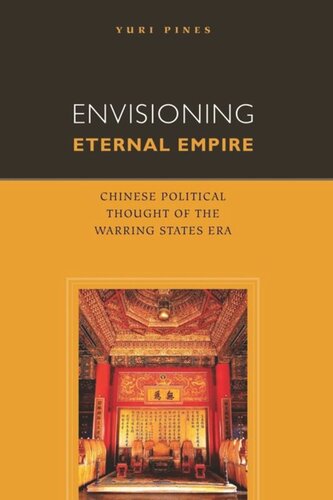

Most ebook files are in PDF format, so you can easily read them using various software such as Foxit Reader or directly on the Google Chrome browser.
Some ebook files are released by publishers in other formats such as .awz, .mobi, .epub, .fb2, etc. You may need to install specific software to read these formats on mobile/PC, such as Calibre.
Please read the tutorial at this link: https://ebookbell.com/faq
We offer FREE conversion to the popular formats you request; however, this may take some time. Therefore, right after payment, please email us, and we will try to provide the service as quickly as possible.
For some exceptional file formats or broken links (if any), please refrain from opening any disputes. Instead, email us first, and we will try to assist within a maximum of 6 hours.
EbookBell Team

5.0
28 reviewsThis ambitious book looks into the reasons for the exceptional durability of the Chinese empire, which lasted for more than two millennia (221 BCE–1911 CE). Yuri Pines identifies the roots of the empire’s longevity in the activities of thinkers of the Warring States period (453–221 BCE), who, in their search for solutions to an ongoing political crisis, developed ideals, values, and perceptions that would become essential for the future imperial polity. In marked distinction to similar empires worldwide, the Chinese empire was envisioned and to a certain extent "preplanned" long before it came into being. As a result, it was not only a military and administrative construct, but also an intellectual one. Pines makes the argument that it was precisely its ideological appeal that allowed the survival and regeneration of the empire after repeated periods of turmoil.
Envisioning Eternal Empire presents a panoptic survey of philosophical and social conflicts in Warring States political culture. By examining the extant corpus of preimperial literature, including transmitted texts and manuscripts uncovered at archaeological sites, Pines locates the common ideas of competing thinkers that underlie their ideological controversies. This bold approach allows him to transcend the once fashionable perspective of competing "schools of thought" and show that beneath the immense pluralism of Warring States thought one may identify common ideological choices that eventually shaped traditional Chinese political culture. The result is a refreshingly novel look at the foundational period in Chinese intellectual history.
Pines’ analysis of the political thought of the period focuses on the thinkers’ perceptions of three main components of the preimperial and imperial polity: the ruler, the elite, and the commoners. Regarding each of them, he identifies both the common ground and unresolved intrinsic tensions of Warring States discourse. Thus, while thinkers staunchly supported the idea of the omnipotent universal monarch, they were also aware of the mediocrity and ineptitude of acting sovereigns. They were committed to a career in government yet feared to compromise their integrity in service of corrupt rulers. They declared their dedication to "the people" yet firmly opposed the lower strata’s input in political processes. Pines asserts that the persistence of these unresolved tensions eventually became one of the most important assets of China’s political culture. The ensuing imperial political system was not excessively rigid, but sufficiently flexible to adapt itself to a variety of domestic and foreign pressures. This remarkable adaptability within the constant ideological framework contributed decisively to the empire’s longevity.